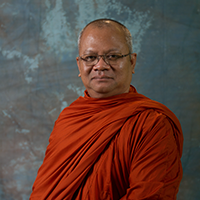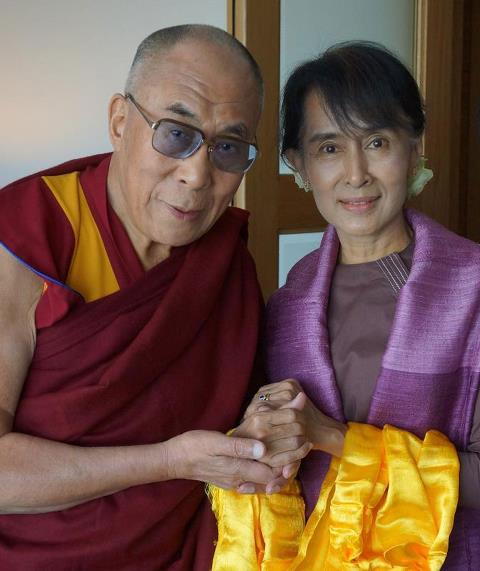In Lowell, Massachusetts, a sex-tape scandal involves neither unscrupulous celebrities nor hapless victims of disgruntled exes, but a Buddhist temple, a monk, and a community organizer with some shady finances. The city’s Cambodian community has been rocked by the recording of prominent community leader Maya Men having sex with a monk—in a temple. Both Men and the monk, Ven. Nhem Kimteng, were part of an executive committee responsible for fundraising and overseeing the construction of a new $10 million temple, thus involving the area’s sizable Cambodian community, which settled in Lowell in the 1970s following the Khmer Rouge-led genocide in Cambodia. The committee was already mired in controversy with accusations of suspicious finances and a lack of transparency.

Much to the shock of onlookers, Men, who is suing five men for illegally producing and distributing the video, has denied having sex with the monk. Men testified that the videotape shows her and Ven. Nhem Kimteng “rocking back and forth” and nothing more, which elicited laughter in Lowell Superior Court. While this claim immediately seems, well, ridiculous, such an act of desperation makes more sense with some context, which Jezebel provides, reporting that Men has been accused of “using her sex life to take control of all top-level monks” and has been publicly shamed by her community in an insular kind of “slut-shaming.” This author is left wondering, What of the monk?
Over at BBC News, Oxford University professor Alan Strathern asks, “Why are Buddhist monks attacking Muslims?” Buddhist monks from Burma to Sri Lanka have snatched headlines by neglecting the Buddhist doctrines which emphasize compassion and nonkilling. While the principle of nonviolence is arguably more central to Buddhism than any other major religion, Strathern demonstrates a number of false assumptions about the historical relationship between Buddhism and violence, of which he is quick to disabuse us:
However any religion starts out, sooner or later it enters into a Faustian pact with state power. Buddhist monks looked to kings, the ultimate wielders of violence, for the support, patronage and order that only they could provide. Kings looked to monks to provide the popular legitimacy that only such a high moral vision can confer.
The existence of such a pact between state forces and the sangha in Burma has been corroborated by Human Rights Watch, who accused Buddhist monks, local politicians, state security forces, and government officials of fomenting a campaign of ethnic cleansing.
Earlier this week ethno-religious unrest inched ever closer to Yangon, the country’s largest city and former capital. Buddhist mobs killed at least one, injured many, and leveled more than 70 homes just 50 miles north of Yangon in the town of Okkan. Witnesses report that police did nothing to protect Muslims, echoing witness reports from both Rakhine state and, more recently, Meikhtila. In this instance, even Buddhist men who tried to convince attackers to stop were beaten up.

Penny Green, director of the International State Crime Initiative, places responsibility squarely on the shoulders of Nobel Peace Prize laureate Aung San Suu Kyi:
It is Aung San Suu Kyi’s refusal to speak out against the crimes endured by the Rohingya that has provided cover for the international community’s failure to intervene. At the outset of the recent waves of anti-Muslim violence, Myanmar’s icon of freedom and democracy was at one with the military-backed government in her singular calls for the restoration of law and order by – it must be noted – the very same state security forces which so terrorised the entire Myanmar population for five brutal decades.
Rather than stand up against Buddhist-led racism, she has pegged her colours firmly, not to the oppressed Rohingya, nor to the increasing victims of Islamophobia, but to her former military jailors, for whom she shares a “great fondness” and whom she now charges with the task of implementing the rule of law.
Burma’s rulers are Buddhist, and they support the Buddhist sangha. The laws they make and upkeep are designed to maintain this concentration of power, to the detriment of minority groups that comprise about a third of the population. Chair of the New National Democracy Party Thein Nyunt said that the citizenship law which bars Rohingya Muslims “is intended to protect our race; by not allowing those with mixed blood from making political decisions [for the country].”
In western Burma, where anti-Muslim violence first erupted, a Muslim man was sentenced to two years in prison for removing a “969” sticker from a shop window. The stickers, representing the Buddhist ultra-nationalist movement in the country, have been used to distinguish anti-Muslim businesses. Buddhist monks have encouraged local Buddhists not to patron shops, drivers, and other businesses that refuse to display the sticker.
For these reasons, it’s no surprise that a US government commission has recommended that Burma remain on the State Department list of the 15 countries with the least freedom of religion. The commission also expressed doubt regarding the official death toll in Rakhine State violence, estimating the real figure to be about five times higher—around 1,000 dead. More surprisingly, the commission recommended that the US government maintain sanctions and even reimpose lifted sanctions until the Burmese government makes reforms to increase religious freedom. It is doubtful, however, that such measures will be taken.
It should be noted that Muslims aren’t the only victims. Burma has also systematically abused Christian civilians during military interventions in Kachin State, where state forces have forcibly promoted Buddhism as a means of pacification. This is more or less the same government that assassinated Buddhist monks by the hundreds in 2007.
In other news:
- One man promises that with meditation, “If sex is an ocean, you become a world class surfer on 60ft waves of bliss.”
Thank you for subscribing to Tricycle! As a nonprofit, we depend on readers like you to keep Buddhist teachings and practices widely available.